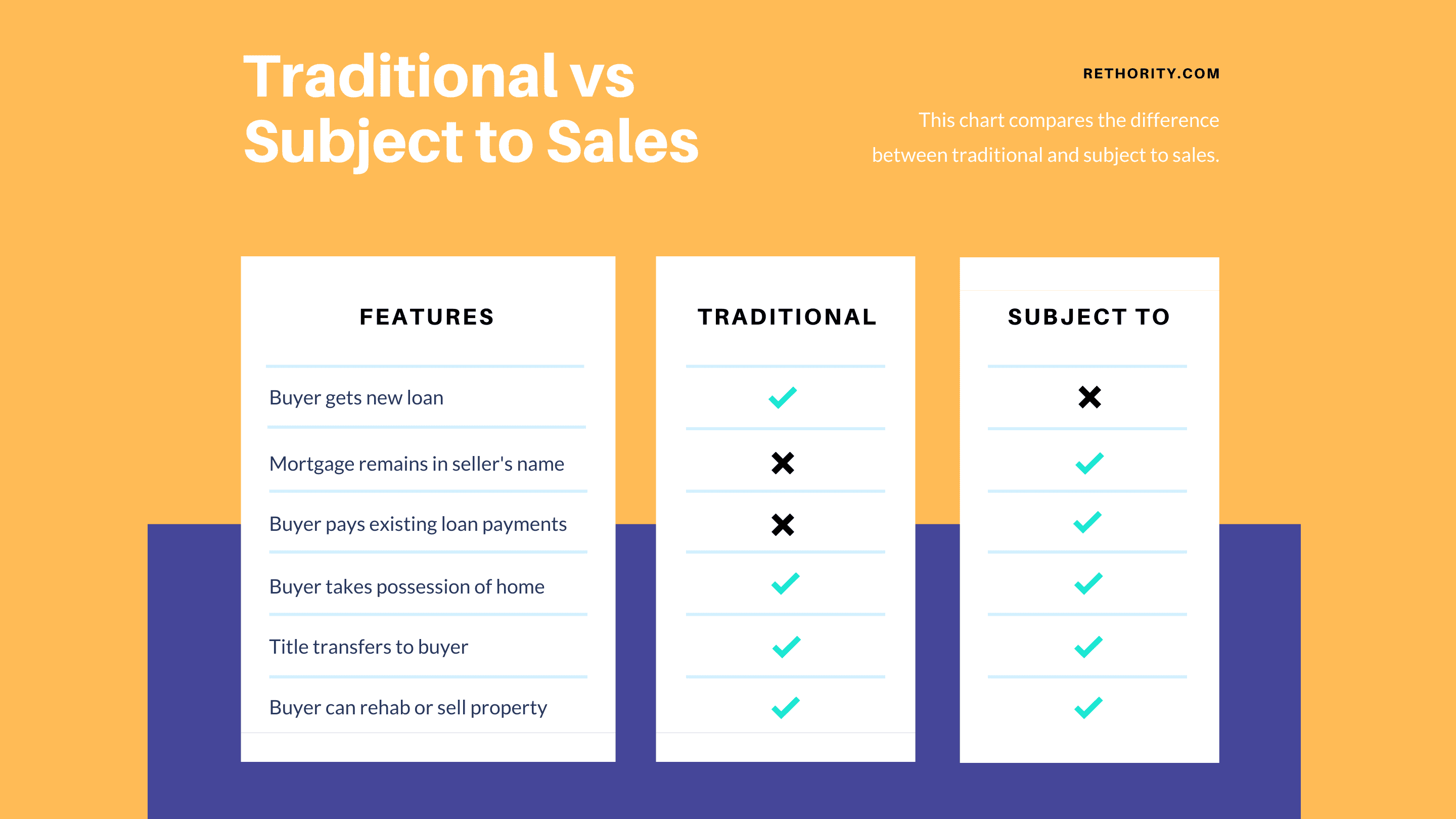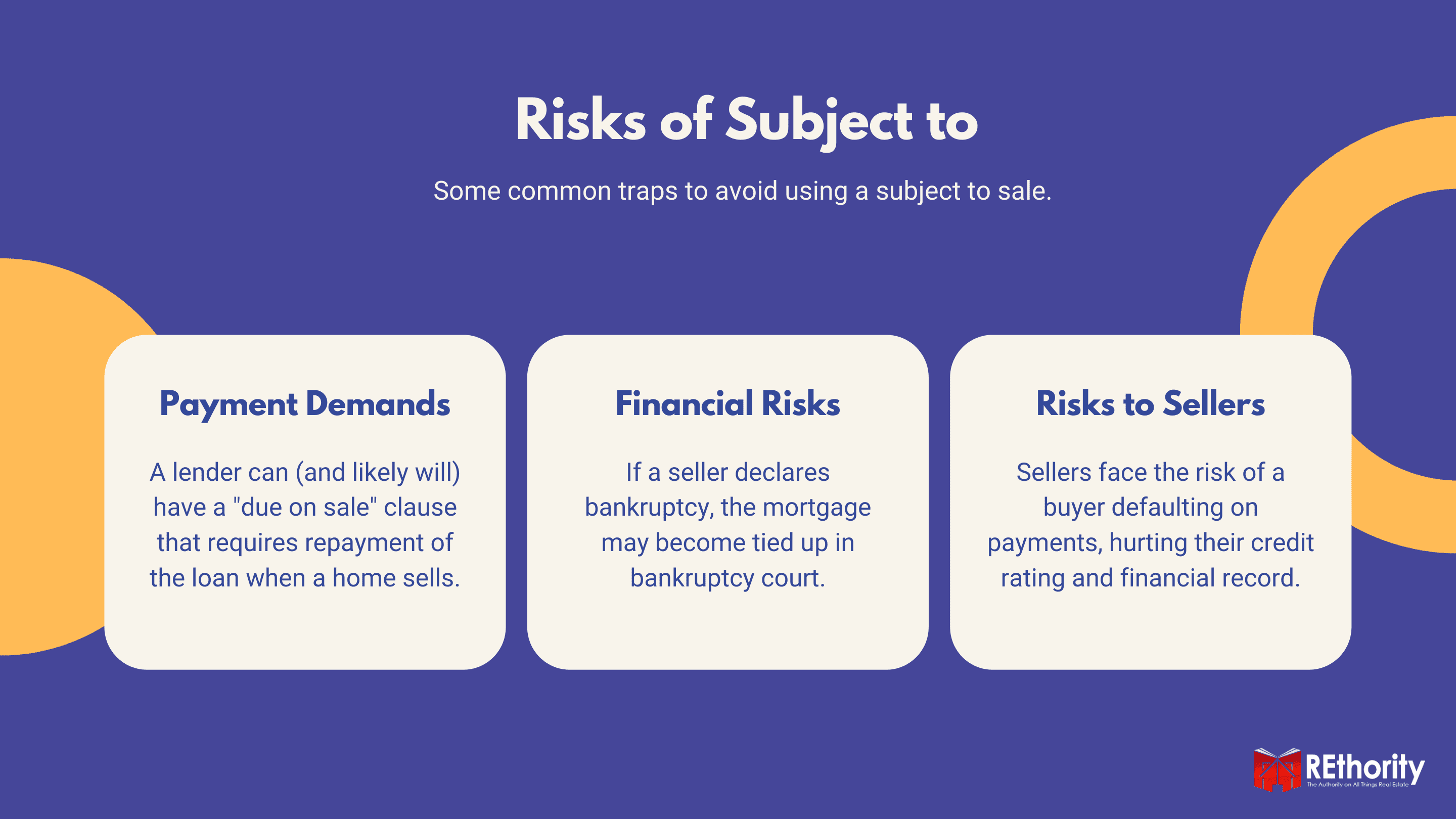Subject-to deals offer real estate investors greater flexibility compared to traditional deed transfers.
Read on to learn what this tricky term means and what to consider when entering into a deal.
What Is Subject To in Real Estate?
Subject to is shorthand for a way to acquire investment properties without using the investor’s own cash or credit and only works in certain circumstances.

It also has significant risks and limitations. Regardless, subject to financing is a technique every savvy real estate investor should understand.
Put simply, being a subject to real estate deal means that a homebuyer assumes responsibility for the seller’s mortgage payments.
In a subject to deal, a buyer takes over the seller’s loan payments. Before doing that, however, the investor negotiates a deal with the seller, giving the buyer legal title to the house.
Traditional vs Subject To Sales
The key difference with buying property subject to is that the buyer doesn’t get a new loan to replace the existing mortgage. The existing mortgage remains in the seller’s name.
Instead, the investor is obligating himself to make payments on the existing loan. In return, the seller grants the investor title to the property.

The language in the contract states the buyer owns the property “subject to” the claim of the holder of the existing mortgage. Hence, in real estate investing, it is called a “subject to” deal.
In many ways, this is similar to any real estate purchase. The seller moves out, and the title of the property transfers to the buyer.
The buyer can then sell it to another investor. Alternatively, the buyer can rehab it and flip it to an owner-occupant. Or the buyer keeps the property and rents it out for income.
Advantages of Subject To Real Estate Deals
Subject to enables an investor to acquire property quicker than a traditional purchase by avoiding the down payments.
Advantages of owner-financed deals include:
- Acquiring properties without using investors’ own cash for a down payment
- Investors don’t need to qualify for a loan or even deal with a lender
- Lower closing costs due to not having to pay for appraisals, fees, and points
- Lower interest rate since the original loan was to owner-occupant
- Taking over payments later in existing loan term when more goes to principal
Subject to letting a real estate investor do deals in much less time than he or she could using conventional means because the investor doesn’t need to use his own cash.
As a result, you can do many more deals. And because costs are lower, subject to also allows for more profit from each one.
Subject To Risks
Relatively few deals are done subject to. The reason is that there are significant risks to both the buyer and the seller.
For investors, potential risks include:
Lenders Demanding Payment
The lender is demanding immediate payment of the seller’s mortgage in full. Many loans have due-on-sale clauses requiring the loan to be paid in full when the property changes hands.
In practice, mortgage companies do not usually exercise this clause. But it is possible and could present a problem if the investor can’t easily refinance the loan.

Financial Risks
The seller could declare bankruptcy, causing the mortgage to become tied up in bankruptcy court. Undisclosed liens assessed against the property won’t allow you to transfer title when the note is due.
Buyers may also not have enough cash flow to make monthly payments and may even get behind on their obligations. Properties that are too distressed make scaling harder because capital is tied up in renovations.
Risks to Sellers
Sellers also face risks. If the buyer gets behind on the mortgage payments, the seller’s credit rating will be hurt, as the original loan still shows up on the seller’s credit report.
This means the seller is less likely to get another loan to purchase more property. Keep in mind that lenders are skeptical of borrowers with poor credit scores.
Finding Subject To Deals
The first challenge with subject to is finding a suitable deal. Not every investor, property, or seller is well-suited to this investor’s tool. The main requirement is finding a motivated seller.
These sellers are usually distressed; they need to sell the property, and there is some constraint. Here are some of the types of motivated sellers.
- Distressed Property: The property may require costly updating or repair that the seller doesn’t have the money to pay for.
- Job Transfers: The seller needs or wants to move due to a job transfer or other reason, can’t afford two mortgage payments and doesn’t want to deal with renters.
- Insufficient Cash: They may have insufficient cash or equity to sell. A conventional sale generally requires the seller to pay agents’ commissions and other closing costs. Subject to lets the seller get rid of the property without a closing and associated costs.
- Pending Foreclosure: The seller may be behind on payments and facing foreclosure. If the investor can step in and start making payments immediately, this can solve a big problem for the seller.
- Liens: The seller may have other liens against the house due to a home equity loan or other reason.
- Motivated Sellers: The seller may need to sell very quickly. This could be due to a divorce, job loss, illness, or other event. Whatever the cause, the seller doesn’t have time to prep the property for listing and go through the months-long process of a conventional deal.
While sellers in subject to deals are often distressed, they can be too distressed. If they get too far behind on payments and the property goes into foreclosure, a subject to deal probably won’t work.
Subject To Contracts
The subject to language in the contract with the seller is critical. It’s essential to have a real estate attorney look over the contract. The attorney should review other terms of the deal as well.
Different states have different rules about subject to, and it’s important to follow the letter of the law. Although there won’t be a conventional closing to complete the transfer of ownership, the investor should get a title policy.
This will protect against the possibility of other existing lien holders having a claim on the property. To protect both buyer and seller, the investor should arrange for a title company to collect and send in the mortgage payments.
This will make sure the loan stays current and the seller doesn’t get a negative mark on his or her credit rating.
Exiting a Subject To Deal
There are many ways for an investor to exit a subject to real estate deal. These include:
- Use a lease option to generate an option fee and lease payments.
- Sell the property to another investor to fix and flip or rent.
- Refinance the property and pay off the existing mortgage.
- Assign the contract to a different investor.
- Or keep the property as a rental.
- Then fix and flip the property.
Basically, you can use just about any exit strategy you’d use if you acquired the property conventionally. This includes rehabbing, renting, leasing-to-own, etc.
Subject To Summary
Subject is not suitable for every property or every seller. It has significant limitations and risks, and it requires great care. This means you should consult an expert for their advice. Real estate attorneys make excellent advisors in these matters.
But subject to deals allow investors to acquire property quickly, easily, and with little cash outlay. While not without risks, this type of own financing is one that every astute investor should understand.
Have you ever done a subject to real estate deal? Let us know about it in the comments section below!

